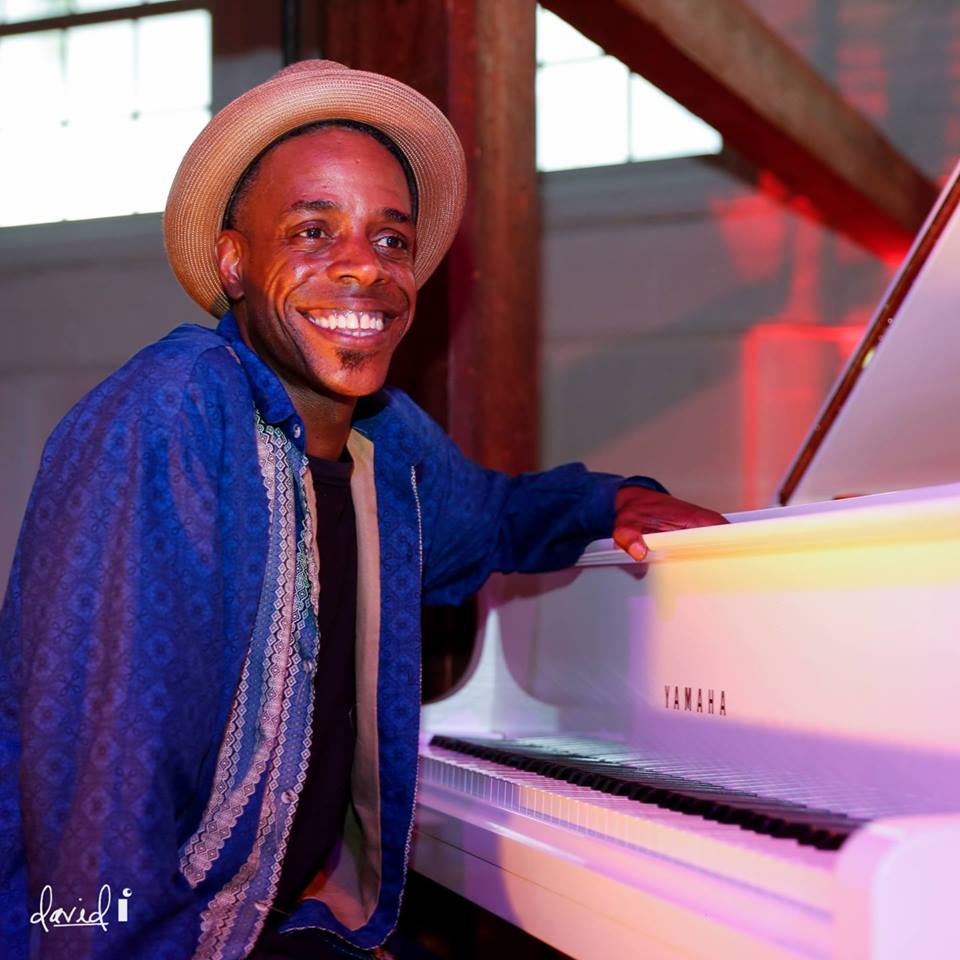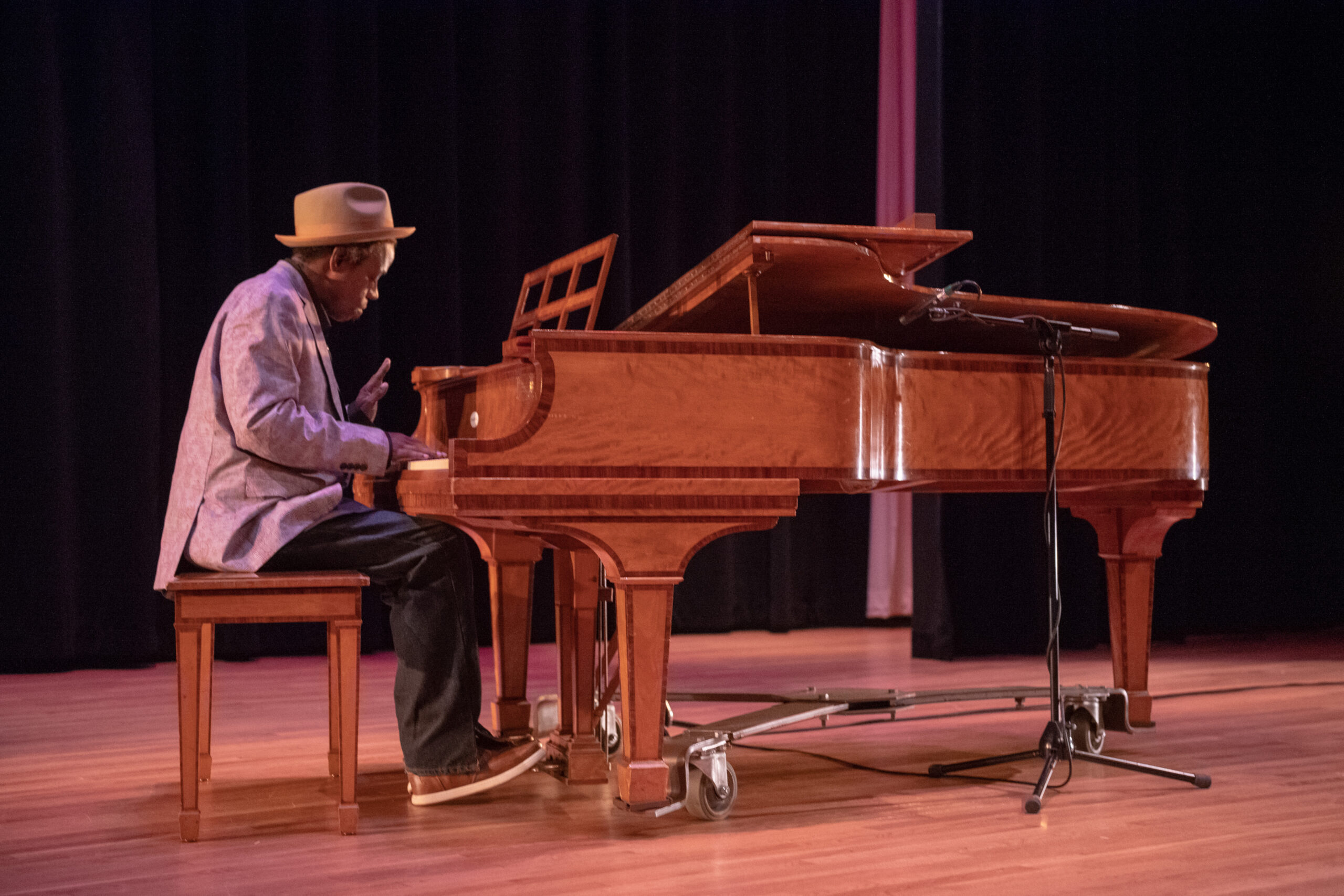 The first time Lafayette Gilchrist ’92 touched a piano was the summer before his first semester at UMBC. He was taking an English class in the Fine Arts Building and wandered into the recital hall, which was empty and completely dark with the exception of a single spotlight on the nine-foot Steinway piano. The 17-year-old felt drawn to it.
The first time Lafayette Gilchrist ’92 touched a piano was the summer before his first semester at UMBC. He was taking an English class in the Fine Arts Building and wandered into the recital hall, which was empty and completely dark with the exception of a single spotlight on the nine-foot Steinway piano. The 17-year-old felt drawn to it.
“It sounds like a movie but it is actually the truth. I sat down at the piano, put my foot on the pedal to the right and began to play; first I played just the black keys, then just the white keys,” said Gilchrist.
Today his life is music. A celebrated jazz pianist and composer, he steadily leads both the New Volcanoes – a band he began as a quartet in 1993 and grew to an octet and sometime nontet over the years – and the Sonic Trip Masters All Stars. Both are genre-defying bands that reflect his deep experience playing and listening to jazz, hip-hop, and African rhythms and his commitment to musical collaboration. In addition to the two bands and his solo work, he has been playing, recording and touring with saxophonist David Murray in his quartets and octets since 2000, touring and playing festivals around the world. And, this past spring, he received a Baker Artist Award for his years of hard work.
An Artist’s Beginnings
Gilchrist grew up in Washington, D.C., and later Prince George’s County, and was planning to join the Army until his mother and stepfather urged him to go to college. He agreed to try it for a year. He started at UMBC as an economics major that first year, in deference to the wishes of his mother, and graduated with a degree in Africana Studies in 1992 that still enriches his life today, he says. But most significantly, when he left UMBC he was a musician.
At the recital hall that first time at the piano, another student, Michael Wutah, from Salisbury by way of Ghana, wandered in and assumed Gilchrist could play. They ended up as first year roommates and musical friends for life. Lacking the formal training that most have before majoring in music in college, Gilchrist instead pursued a musical training of his own design while at UMBC, noting “the resources I was able to tap as a student were no less formative to me than had I been a music major.”
Checking out records and videos from the AOK Library to expand upon his musical and artistic knowledge, he spent evenings, as he puts it, haunting the practice rooms in the music department. “I had access to the best pianos at UMBC,” says Gilchrist, who sometimes was able to convince members of the cleaning crew to let him into the practice spaces.
He learned to play and compose at the same time, auditing Stuart Smith’s new music composition classes, and pestering his music major friends to help him translate his compositions to paper for weekly assignments as he caught up. He especially credits Michael Cerri, former head of music recording, with “helping me separate the distance of what was in my head to a recording.” So immersed was he in music, Gilchrist’s cousin, a fellow student on campus, occasionally had to find him in the practice rooms and remind him of his other classes.
Making His Mark
Gilchrist mentions that 2017 was a big year for him professionally. It’s a bit of an understatement.
His composition, “Assume the Position,” was selected in 2017 as the outro music of each episode of David Simon’s latest HBO series “The Deuce.” Gilchrist, who reworked the piece for the series, chuckles and says it’s his “moneymaker.” The new arrangement is included on Deep Dancing Suite, Lafayette Gilchrist & The New Volcanoes’ latest album, released in July.
That same year, the band released their New Urban World Blues album and the song and video “Blues For Freddie Gray,” dedicated to the young West Baltimore man who died in 2015 of severe spinal injuries sustained while in the custody of the Baltimore City Police. Gilchrist, who lives in West Baltimore, remembers the days surrounding the death of Freddie Gray; the song was inspired by his experience and listening to the way friends and neighbors processed Gray’s death and the eruption in the city that followed.
I want to know that there’s a day that’s coming soon and fast
I want a justice and a peace that’s made to last and last
Don’t ya tell me
That we can’t all get it done
You see I got this little one on my shoulders.
— excerpt of lyrics from Blues For Freddie Gray
Gilchrist says “Blues for Freddie Gray is a cry…it’s a response” to the horrific events of Gray’s death and the fact that none of the police officers connected with his death was convicted of any crime.
“People don’t have guns, media, voices — the only power we have is in numbers,” says Gilchrist. “I thought what can I do to have an impact, I could get in the street, I could carry a sign, but that is not what I do best. What I do best is music.”
In May 2018, Gilchrist received a Baker Artist Award, an honor granted to accomplished artists, and a cash award that will help him continue to compose, perform, and record.
“I was surprised and honored,” he said. “As a Baltimore-based artist laboring in the vineyards for quite a few years, often taking more losses than wins in order to keep the band afloat and get the music out, the award means a great deal to me because it’s confirmation in many ways that it’s been worth it.”
While the process of composing and writing can be lonely, he says, “the Baker Artist Award for me is just another sign to know I’m not alone.”
— Catherine Borg
Header image by Theresa Keil.
Tags: Fall 2018

